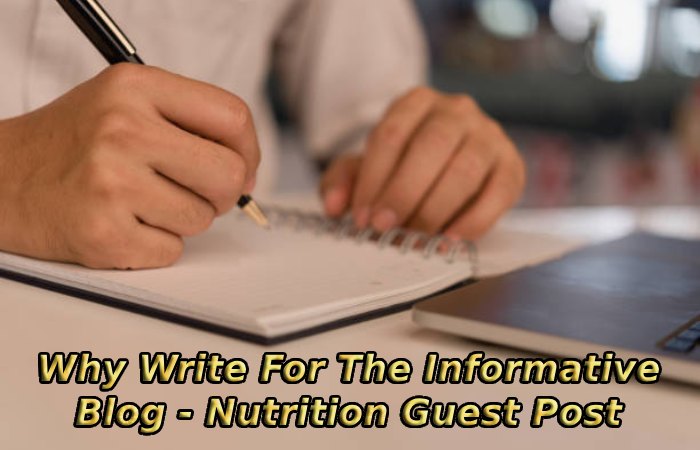Nutrition Guest Post
TheInformativeblog.com, is a website where we are accepting Guest posts, where curiosity meets enlightenment in a digital realm. Our website is a haven for seekers of knowledge, delivering a diverse blend of information across various subjects. From the latest in technology to profound insights into science, health, lifestyle, and beyond, we are your one-stop destination for thought-provoking content.
At The Informative Blog, we take pride in offering a curated collection of articles that not only inform but also captivate and inspire. Our platform is crafted with the belief that learning should be a dynamic and enjoyable experience. We bring together a team of dedicated writers and experts to ensure each piece is well-researched, engaging, and relevant.
Explore the vast expanse of our content and embark on a journey of discovery. Whether you’re a seasoned enthusiast or a casual reader, The Informative Blog invites you to delve into a world where knowledge knows no limits. Stay tuned for consistent updates that will keep you informed and entertained. Welcome to a space where information empowers and enlightens. Please email us at contact@theinformativeblog.com
Milk Nutrition:
Milk is a nutrient-rich beverage that offers a wide array of essential nutrients necessary for overall health. It is an outstanding source of calcium, a mineral key for the development and maintenance of strong bones and teeth. Additionally, milk contains high-quality proteins that contribute to muscle growth, repair, and overall body function.
One of the notable components of milk is vitamin D, which everything in tandem with calcium to support bone health and plays a role in immune system function. The B vitamins found in milk, including B12, riboflavin, and niacin, contribute to vigor metabolism and the maintenance of a healthy nervous system.
Milk also contains phosphorus, magnesium, and potassium, important minerals that show vital roles in various physiological processes, such as nerve function and blood pressure regulation. Furthermore, milk offers a natural source of hydration, providing fluid to maintain proper bodily functions.
It’s important to note that individuals who are lactose intolerant can choose for lactose-free milk or alternative dairy products fortified with similar nutrients. Overall, milk stands as a versatile and nutrient-dense beverage that can significantly contribute to a well-rounded and balanced diet.
How To Submit Article For The Informative Blog
To submit article, you can pitch us at contact@theinformativeblog.com
Why Write For The Informative Blog – Nutrition Guest Post

- Writing for The Informative Blog can give massive exposure to your site for customers looking for Nutrition.
- The Informative Blog presence is on social media and will share your article with the Nutrition-related audience.
- You can reach out to Nutrition enthusiasts.
Nutrition Guest Post Related Search Terms
- Importance Of Micronutrients
- Benefits Of A Balanced Diet
- Plant-Based Nutrition Facts
- Omega-3 Fatty Acids Sources
- Probiotics And Gut Health
- Nutritional Needs For Athletes
- Sugar And Its Impact On Health
- Vitamins And Minerals Chart
- Calcium-Rich Foods For Bone Health
- Importance Of Hydration In Nutrition
- Anti-Inflammatory Foods List
- Iron-Rich Foods For Vegetarians
- Dietary Fiber Benefits
- Nutritional Value Of Superfoods
- Meal Planning For Weight Loss
- Healthy Cooking Techniques
- Nutritional Needs During Pregnancy
- Importance Of Protein In The Diet
- Fasting And Nutritional Balance
- Nutritional Requirements For Seniors
Search Terms – Nutrition Guest Post
- Nutrition Guest Post
- Guest Post Nutrition
- Nutrition + Write For Us
- Write For Us + Nutrition
- Guest Post + Nutrition
- Nutrition + Guest Post
- Submit an article
- Contribute Nutrition
- Nutrition Submit post
- Nutrition writers wanted
Article Guidelines On The Informative Blog – Nutrition Write For Us
We at The Informative Blog welcomes fresh and unique content related to Nutrition.
The Informative Blog allow a minimum of 500+ words related to Nutrition.
The editorial team of The Informative Blog does not encourage promotional content related to Nutrition.
For publishing article at The Informative Blog email us at contact@theinformativeblog.com
The Informative Blog allows Posts related to Tech, Business, Marketing, Health, Diet, Beauty, Nutrition and many more
Related Pages:
Diet Guest Post
Fitness Guest Post
Health Guest Post
Marketing Guest Post
News Guest Post

